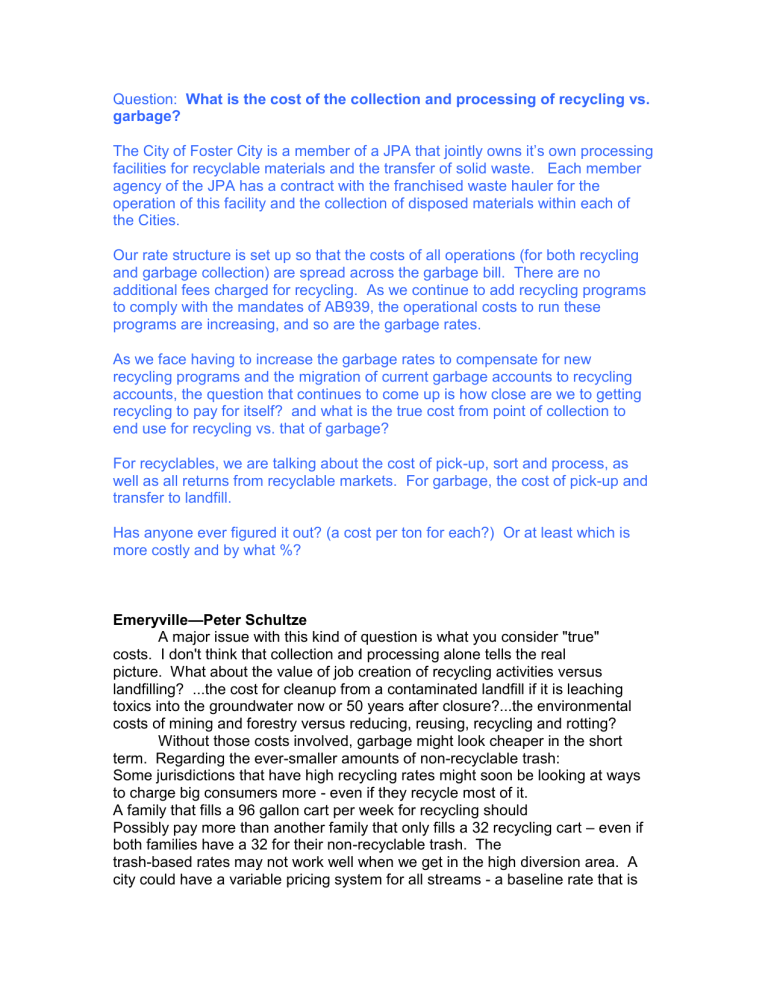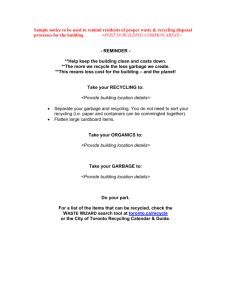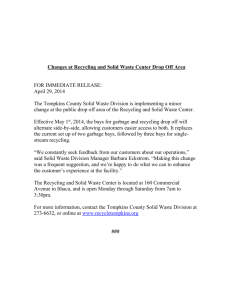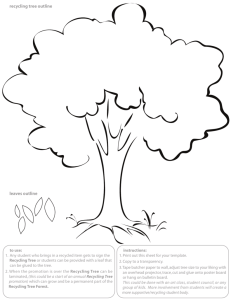Gary Liss

Question: What is the cost of the collection and processing of recycling vs. garbage?
The City of Foster City is a member of a JPA that jointly owns it’s own processing facilities for recyclable materials and the transfer of solid waste. Each member agency of the JPA has a contract with the franchised waste hauler for the operation of this facility and the collection of disposed materials within each of the Cities.
Our rate structure is set up so that the costs of all operations (for both recycling and garbage collection) are spread across the garbage bill. There are no additional fees charged for recycling. As we continue to add recycling programs to comply with the mandates of AB939, the operational costs to run these programs are increasing, and so are the garbage rates.
As we face having to increase the garbage rates to compensate for new recycling programs and the migration of current garbage accounts to recycling accounts, the question that continues to come up is how close are we to getting recycling to pay for itself? and what is the true cost from point of collection to end use for recycling vs. that of garbage?
For recyclables, we are talking about the cost of pick-up, sort and process, as well as all returns from recyclable markets. For garbage, the cost of pick-up and transfer to landfill.
Has anyone ever figured it out? (a cost per ton for each?) Or at least which is more costly and by what %?
Emeryville
—Peter Schultze
A major issue with this kind of question is what you consider "true" costs. I don't think that collection and processing alone tells the real picture. What about the value of job creation of recycling activities versus landfilling? ...the cost for cleanup from a contaminated landfill if it is leaching toxics into the groundwater now or 50 years after closure?...the environmental costs of mining and forestry versus reducing, reusing, recycling and rotting?
Without those costs involved, garbage might look cheaper in the short term. Regarding the ever-smaller amounts of non-recyclable trash:
Some jurisdictions that have high recycling rates might soon be looking at ways to charge big consumers more - even if they recycle most of it.
A family that fills a 96 gallon cart per week for recycling should
Possibly pay more than another family that only fills a 32 recycling cart – even if both families have a 32 for their non-recyclable trash. The trash-based rates may not work well when we get in the high diversion area. A city could have a variable pricing system for all streams - a baseline rate that is
lower for garbage, and free for recycling and composting, and then charge for larger amounts of capacity for all streams.
Fresno--Robert Gedert
The City of Fresno rate structure is set up so that the costs of all operations
(collection, admin and disposal/processing) are calculated separately for each commodity: trash, recycling, and green waste. We hire a consultant to do a rate nexus study every 3 to 4 years, and adjust residential billing based on true costs.
The last study (year 2000) yielded the following: $7.20 per month trash, $5.40 per month recycling, and $5.40 per month green waste. This is the $18.00 monthly charge per household per month, with three 96 gallon can service (trash, recycling, green waste). This fee covers all collection costs, disposal costs, and administration charges. The calculation is a bit outdated, therefore we are requesting another study for the spring 2004. The lower costs for recycling and green waste reflect the lower tipping fees at the processors (private sector, vs. the landfill tipping fee for trash. Collection and Admin costs are very close to the same for all three commodities, per household per month.
Although not responding to the direct question of direct recycling costs, please consider the positive effects recycling has on the local and national economy. The National Recycling Coalition, through a grant from
USEPA, studied the economic impact recycling has in the national economy. The study is called the "National Recycling Economic Information Project", and results are located on the following website: http://www.nrc-recycle.org/resources/rei/reihome.htm
Concord
—Jeff Roubal
Our recycling is also included in the trash rates. Concord Disposal
(707-682-9113) bid the rate to us as all inclusive. They have an exclusive franchise agreement for picking up residential trash and cubrside recycling in
Concord.
Sunnyvale
—Mark Bowers
We here at Sunnyvale have also been very interested in calculating diversion costs and have developed the attached analytical spreadsheet to compare the costs of various methods of diverting a ton of material from the landfill. As you can see in the tab labeled "Recycling 02-03, recycling cost varies from a low of
$11 per ton for MRF diversion at the Sunnyvale Materials Recovery and Transfer
(SMaRT(R)) Station to a high of $129 per ton for our Multi-Family Recycling
Program.
The recycling analysis includes a credit for avoided landfill costs and relies on a number of City-specific assumptions, some of which are not seen until you look in the cell formulas. Some of these are explained by footnotes at the bottom of the page or the "Explanation" and "Definition" tabs in the spreadsheet.
I had not applied this analysis to garbage costs, but in response to your question
I added the tab "Garbage 02-03" to the spreadsheet. Garbage collection/MRF/transfer/disposal cost varies from $119 per ton for rolloff boxes/compactors and commercial front load garbage to $186 per ton for single family residential (primarily automated collection).
Also included an excel spreadsheet attached in email
Chris Boyd
I have looked at this issue in New York City and suggest that you look go to copmtroller.nyc.gov
and look at the Office of Policya and Management reports/letters section to see how this issue has been raised here.
There are lots of methods for assessing costs, but ultimately, it generally boils down to down to collection productivity/costs and disposal/processing cost for the direct costs.
Gary Liss
From: Joe Massey
Coalition of Independent Recyclers
This is a biased response from a 40-year recycling veteran.
Curbside collections are not doing their job. For example, aluminum cans have a scrap value of $.40 lb. in addition to the $.78 lb. of CRV for a total of $1.18 lb. In
2002, the Department of Conservation reported that only 74% were redeemed.
The logical assumption is that the balance, 26%, were discarded and wound up in the trash. The amount that were separated and redeemed is included in the
53% redeemed so the 26% was lost in the trash despite a value of over $96 million.
Perhaps jurisdictions should develop a plan whereby they promote the certified recyclers in their jurisdictions rather than Curbside collectors. Thereby diverting more from the landfills and obtaining reliable, verifiable numbers from the
Department of Conservation.
In addition, they would save the money they spend on Curbside programs. All recyclers certified by the Department are required to redeem all beverage containers and often pay for other materials, if allowed to accept them by the jurisdiction.
From: Harrisburg, PA--Georgia Kagle, PADEP
Chief, Recycling Markets Program
You might want to look through our Act 175 Recycling Plan (pages 3-8) and see how PA attempts to address the issue of costs and benefits of recycling. http://www.dep.state.pa.us/dep/subject/advcoun/Recycle/2003/RECYCLINGPLA
N_091103%20_recs.pdf
Recycling is a service, just like disposal, and therefore has a cost. To evaluate the return on investment, you need to consider all of the benefits of recycling, not just the monetary cost. Having been through a lot of discussions this year with our county recycling coordinators in drafting this plan, I understand that it is a difficult sell for local governments to justify increased fees.
From: Peter Anderson
RECYCLEWORLDS CONSULTING Corp
Harry Truman was wont to say, "please, God, give me a one armed economist!" in response to economists pendantic "on the one hand, and on the other hand" answers to his questions. But the only true answer in response to your question is "it depends." If anyone tells you the answer is this or is that, they don't know what they're talking about. It all depends upon how the program is structured.
All that can be said in general, is that a well designed and operated recycling program should not increase overall costs on average over the course of the fluctuating commodity cycle, and may slightly decrease them. In general, were you to contract out to get an answer to your question, the cost would probably be in the order of $5,000.
Arcata--Dan Hauser
Gainesville, Florida —Regina Hawkins
CONTACT INFORMATION: susankramer@wyoming.com
Susan Kramer
Pinedale, Wyoming dhauser@arcatacityhall.org
Dan Hauser
Robert.Gedert@ci.fresno.ca.us
Robert Gedert
Chief of Commercial Operations
Solid Waste Division
City of Fresno
559-621-1878 pschultze-allen@ci.emeryville.ca.us
Peter Schultze-Allen
Environmental Analyst
City of Emeryville
1333 Park Ave 94608
510-596-3728 fax 596-4389 chrishboyd@yahoo.com
Chris Boyd
212-669-7941 nancy@sws-inc.com
Nancy S. Steiner hawkinsrm@ci.gainesville.fl.us
www.gainesvillerecycles.com
Regina M. Hawkins
Recycling Coordinator
City of Gainesville – M.S. 10
P.O. Box 490
Gainesville, FL 32602-0490
(352) 334-2063
Fax: (352) 334-2213 gary@garyliss.com
Gary Liss
916-652-7850
Fax: 916-652-0485
JMassey218@aol.com
Joe Massey
Coalition of Independent Recyclers gkagle@state.pa.us
Georgia Kagle PADEP
Chief, Recycling Markets Program
Harrisburg, PA
717-787-7382 anderson@recycleworlds.net
Peter Anderson
RECYCLEWORLDS CONSULTING Corp
4513 Vernon Blvd. Suite 15
Madison, WI 53705
Ph: (608) 231-1100
Fax: (608) 233-0011
Cell (608) 438-9062 jeffr@ci.concord.ca.us
Roubal, Jeff
Jeff Roubal
City of Concord
Clean Water Program Manager
Phone (925) 671-3394
Fax (925) 680-1660
DRigge@aol.com
Duane mbowers@ci.sunnyvale.ca.us
Mark Bowers
Solid Waste Program Manager
City of Sunnyvale denise.kotko@ci.west-sacramento.ca.us
Kotko, Denise
Refuse & Recycling Program Manager
City of West Sacramento
1110 West Capitol Avenue, 1st Floor
West Sacramento, CA 95691
(916) 617-4590








